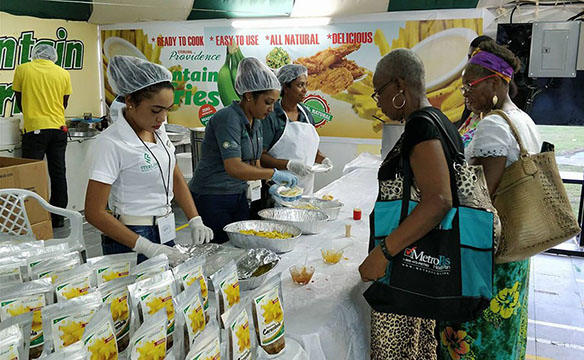Even as progress in securing significant regional and extra-regional markets for locally manufactured agro- produce continues to move at a snail’s pace, the Guyana Manufacturing and Services Association (GMSA) has been enjoying a protracted run of ‘good form’ in its efforts to raise local awareness of the range of products that have made their way onto the local market.
On Wednesday the GMSA staged a one-day workshop titled “Micro & Small Business Development” at the Regency Suites, Hadfield Street, Georgetown, covering a range of themes relevant to the development of the sector including what a release from the GMSA Secretariat said, was an anticipated “exposure to a variety of theoretical and practical underpinnings that guide entrepreneurship and small business development.” The GMSA said it was seeking through its training exercise to provide small business owners “with practical examples of small business management and entrepreneurship.”
The training exercise was also expected to address the issue of “effective management and leadership,” with the aim of increasing participants’ understanding and awareness of managing staff and developing leadership skills. That aspect of the training programme, according to the GMSA disclosure, was expected to cover human resource management, motivation and reward, conflict resolution and managing self. Finally, the training exercise was expected to cover ‘Financial Planning for Small Business’, a course that was expected to expose participants to the basic accounting methods and practices that are required for a small business or an entrepreneurial activity.
The Wednesday initiative, however, is only the tip of an impressive run of form which the GMSA has been enjoying in its product promotion pursuits targeting mostly fledgling small and micro businesses; its blue ribbon accomplishment so far being the partnering with the Ministry of Business to stage three successive UncappeD expositions designed primarily to afford local agro-processors the opportunity of a major local market for their produce.
In a message published in the GMSA’s 2018 Annual Report, Finance Minister, Winston Jordan, alluded to what he described as the “heightened collaboration between government and the GMSA,” referring specifically to consultations at the level of the Inter Ministerial Round Table and national budget consultations. In his message Jordan noted that government had addressed about twelve of the recommendations put forward by the GMSA for Budget 2019.
Not only has the input of the GMSA seen the emergence of new entrepreneurial initiatives insofar as new agro- produce is concerned, but it has also manifested itself in a significant enhancement in product presentation, an area that has traditionally posed challenges for the agro-processing sector. Aware, these days, of the critical importance of product presentation in a highly competitive marketplace, local agro-processors have raised their game in the areas of labelling and packaging, their product presentation adding a new dimension of customer friendliness to the increasing number of product-promotion events.
The steady growth of the agro-processing sector, however, and particularly the sense of self-esteem that it has afforded small manufacturers has not been without its challenges. If the local agro-processing sector is to grow and prosper it must enter the demanding realm of external product promotion, a costly pursuit which for the vast majority of brand owners, is unaffordable. While these days, there is no shortage of regional and international marketing activities available through trade fairs and other product promotion opportunities, the costs associated with participating in these events is prohibitive. This applies, notwithstanding the limited support that is sometimes available through the Guyana Office for Investment (GO-Invest).
Access to external markets also depends on products meeting food safety standards which, given the limitations associated with testing locally, can also serve as a barrier to export opportunities.
Other considerations linked to the success or otherwise of the local agro-processing sector include effective collaboration between farmers and agro-processors in order to secure reliable raw material supplies and manufacturing capacity linked to the availability of equipment and machinery that would render production more efficient.
The fact that the local agro-processing sector is in the ascendancy, however, is due primarily to the creativity of the small manufacturers, possessed in many instances of little more than their creativity and their kitchen facilities. In recent years, however, due mainly to the ‘teaming up’ between the GMSA and the Ministry, much has changed. Still, the sector has a considerably long road to travel.






